俄罗斯历史英文介绍
英文版的俄罗斯旅游计划
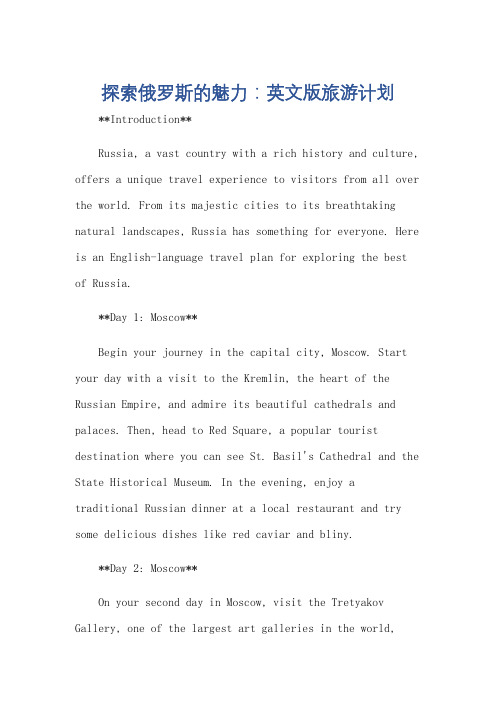
探索俄罗斯的魅力:英文版旅游计划**Introduction**Russia, a vast country with a rich history and culture, offers a unique travel experience to visitors from all over the world. From its majestic cities to its breathtaking natural landscapes, Russia has something for everyone. Here is an English-language travel plan for exploring the best of Russia.**Day 1: Moscow**Begin your journey in the capital city, Moscow. Start your day with a visit to the Kremlin, the heart of the Russian Empire, and admire its beautiful cathedrals and palaces. Then, head to Red Square, a popular tourist destination where you can see St. Basil's Cathedral and the State Historical Museum. In the evening, enjoy atraditional Russian dinner at a local restaurant and try some delicious dishes like red caviar and bliny.**Day 2: Moscow**On your second day in Moscow, visit the Tretyakov Gallery, one of the largest art galleries in the world,housing a collection of Russian art. In the afternoon, explore the Cathedral of Christ the Saviour, a beautiful Orthodox cathedral that offers stunning views of the city. In the evening, enjoy a performance at the famous Bolshoi Theatre.**Day 3: Saint Petersburg**Take a train or flight to Saint Petersburg, Russia's cultural capital. Upon arrival, visit the Hermitage Museum, one of the largest and most famous museums in the world, housing a collection of European art and artifacts. Then, take a stroll along the Neva River and admire the city's beautiful architecture. In the evening, enjoy a cruise on the river and see the city's landmarks illuminated.**Day 4: Saint Petersburg**On your fourth day in Saint Petersburg, visit the famous Cathedral of the Saviour on Spilled Blood, a beautiful Orthodox cathedral that overlooks the Neva River. Then, head to the Palace of the Grand Dukes, a magnificent palace that was once the residence of the Russian royal family. In the evening, attend a concert at the MariinskyTheatre, one of the most famous opera and ballet houses in the world.**Day 5: Golden Ring Cities**Leave Saint Petersburg and travel to the Golden Ring cities, a collection of ancient Russian cities that offer a glimpse into the country's rich history. Visit Suzdal, Vladimir, and Rostov Velikiy, and admire their beautiful churches and monasteries. Enjoy a traditional Russian lunch at a local restaurant and try some local dishes like pelmeni and solyanka.**Day 6: Sochi**Travel to Sochi, a city known for its beautiful beaches and stunning mountains. Spend the day relaxing on the beach or exploring the local markets. In the evening, enjoy a seafood dinner and try some local delicacies like crab and lobster.**Day 7: Volga River Cruise**End your trip with a cruise on the Volga River,Russia's longest river. During the cruise, you will pass through beautiful landscapes and visit interesting townsand villages. Enjoy a traditional Russian lunch on board and mingle with other cruise guests. In the evening, disembark at your final destination and bid farewell tothis amazing country.**Conclusion**Russia is a country that offers something for everyone, from its vibrant cities to its natural wonders. With this travel plan, you can explore the best of Russia and immerse yourself in its rich history and culture. So, pack your bags and embark on this exciting journey!**探索俄罗斯的魅力:英文版旅游计划****引言**俄罗斯,一个拥有丰富历史和文化的辽阔国家,为来自世界各地的游客提供了独特的旅游体验。
俄罗斯之旅英文作文
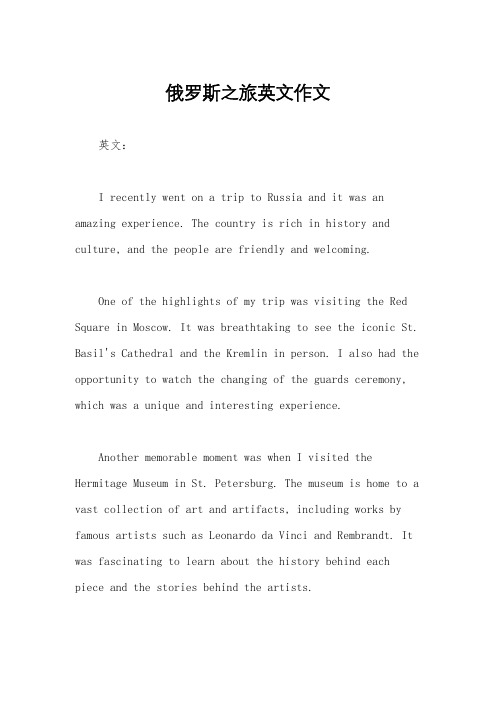
俄罗斯之旅英文作文英文:I recently went on a trip to Russia and it was an amazing experience. The country is rich in history and culture, and the people are friendly and welcoming.One of the highlights of my trip was visiting the Red Square in Moscow. It was breathtaking to see the iconic St. Basil's Cathedral and the Kremlin in person. I also had the opportunity to watch the changing of the guards ceremony, which was a unique and interesting experience.Another memorable moment was when I visited the Hermitage Museum in St. Petersburg. The museum is home to a vast collection of art and artifacts, including works by famous artists such as Leonardo da Vinci and Rembrandt. It was fascinating to learn about the history behind each piece and the stories behind the artists.I also enjoyed trying traditional Russian cuisine, such as borscht and pelmeni. The food was delicious and hearty, and I appreciated the effort put into each dish.Overall, my trip to Russia was a wonderful experience and I would highly recommend it to anyone who loves history, culture, and adventure.中文:我最近去了俄罗斯旅行,这是一次非常棒的经历。
史上最全 俄罗斯 中英双语介绍

史上最全俄罗斯中英双语介绍、HistoryFormerly the dominant republic of the Union of Soviet Socialist Republics (USSR), Russia is now an independent country, and an influential member of the Commonwealth of Independent States, since the union’s dissolution in December 1991. During the Soviet era, Russia was officially called the Russian Soviet Federated Socialist Republic (RSFSR). Russia is usually considered the Soviet Union’s successor state in diplomatic matters.Russia was founded in the 12th century as the Principality of Muscovy. It was able to emerge from over 200 years of Mongol domination (13th-15th centuries) and to gradually conquer and absorb surrounding principalities. In the early 17th century, a new Romanov Dynasty continued this policy of expansion across Siberia to the Pacific. Under Peter I (ruled 1682-1725), hegemony was extended to the Baltic Sea and the country was renamed the Russian Empire. During the 19th century, more territorial acquisitions were made in Europe and Asia. Repeated devastating defeats of the Russian army in World War I led to widespread rioting in the major cities of the Russian Empire and to the overthrow in 1917 of the imperial household.The Communists under Vladimir Lenin seized power soon after and formed the USSR. Josef Stalin (1928-53) strengthened Russian dominance of the Soviet Union.The Soviet Union consolidated its hold on Eastern Europe and sought to expand its influence elsewhere in the world. This active foreign policy helped bring about the Cold War, which turned the Soviet Union’s wartime allies, the United Kingdom and the United States, into foes.Stalin died in 1953 and in the absence of an acceptable successor, the Soviet economy and society stagnated in the following decades until General Secretary Mikhail Gorbachev (1985-91) introduced glasnost (openness) and perestroika (restructuring) in an attempt to modernize Communism. However, his initiatives inadvertently released forces that by December 1991 splintered the USSR into 15 independent republics. Since then, Russia has struggled in its efforts to build a democratic political system and market economy to replace the strict social, political, and economic controls of the Communist period.Most of the area, population, and industrial production of the Soviet Union, then one of the world’s two superpowers, lay in Russia. After the breakup of the USSR, Russia’s global role however has greatly diminished, and cannot be compared to that of the former Soviet Union.历史俄罗斯是前苏联社会主义共和国的主要国家,现在是一个独立国家,自从1991年苏联解体后它是独立的联邦政府中最有影响的成员。
莫斯科英语单词速记
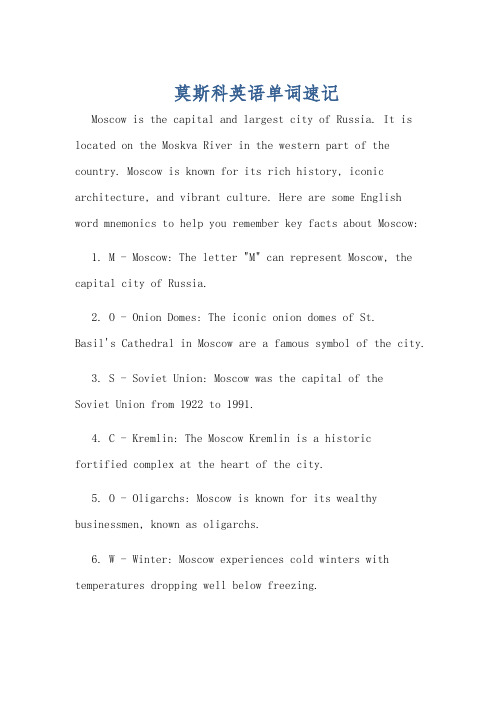
莫斯科英语单词速记Moscow is the capital and largest city of Russia. It is located on the Moskva River in the western part of the country. Moscow is known for its rich history, iconic architecture, and vibrant culture. Here are some English word mnemonics to help you remember key facts about Moscow:1. M - Moscow: The letter "M" can represent Moscow, the capital city of Russia.2. O - Onion Domes: The iconic onion domes of St.Basil's Cathedral in Moscow are a famous symbol of the city.3. S - Soviet Union: Moscow was the capital of theSoviet Union from 1922 to 1991.4. C - Kremlin: The Moscow Kremlin is a historicfortified complex at the heart of the city.5. O - Oligarchs: Moscow is known for its wealthy businessmen, known as oligarchs.6. W - Winter: Moscow experiences cold winters with temperatures dropping well below freezing.7. R - Red Square: Red Square is a famous square in Moscow that is home to many historic buildings.8. D - Dostoevsky: Fyodor Dostoevsky, one of Russia's greatest writers, lived in Moscow.9. A - Arbat Street: Arbat Street is a famous pedestrian street in Moscow lined with shops and cafes.10. N - Novodevichy Convent: The Novodevichy Convent isa historic monastery in Moscow.莫斯科是俄罗斯的首都和最大城市。
俄罗斯历史(英文版)

officially Russian Federation , Russian Rossiya or Rossiyskaya Federatsiya country that stretches over a vast expanse of eastern Europe and northern Asia. Once the preeminent republic of the Union of Soviet Socialist Republics (U.S.S.R.), Russia has been an independent country since the dissolution of the union in December 1991. Under the Soviet system it was called the Russian Soviet Federated Socialist Republic (R.S.F.S.R.). With an area of 6,592,800 square miles (17,075,400 square kilometres), Russia is the world's largest country, covering almost twice the territory of either the United States or China. It ranks sixth in the world in population, following China, India, the United States, Indonesia, and Brazil. The great majority of the people are Russians, but there also are some 70 smaller national groups living within its borders. Most of the population is concentrated in a great triangle in the western, or European, part of the country, although over the past three centuries-and particularly during the early and mid-20th century-there was a steady flow of people eastward to the Asiatic section commonly referred to as Siberia. On its northern and eastern sides Russia is bounded by the Arctic and Pacific oceans, and it has small frontages in the northwest on the Baltic Sea at St. Petersburg and at the detached Russian oblast (province) of Kaliningrad. On the south it borders North Korea, China, Mongolia, and the former Soviet republics of Kazakstan, Azerbaijan, and Georgia. On the southwest and west it borders the former Soviet republics of Ukraine, Belarus, Latvia, and Estonia, as well as Finland and Norway; in addition, Kaliningrad (formerly a part of what was once East Prussia annexed in 1945) abuts Poland and Lithuania. Extending nearly halfway around the Northern Hemisphere and covering much of eastern and northeastern Europe as well as the whole of northern Asia, Russia has a maximum east-west extent, along the Arctic Circle, of some 4,800 miles (7,700 kilometres) and a north-south width of 1,250 to 1,850 miles. There is an enormous variety of landforms and landscapes, which occur mainly in a series of broad latitudinal belts. Arctic deserts lie in the extreme north, giving way southward to the tundra and then to the forest zones, which cover about half of the country and give it much of its character. South of the forest zone lie the wooded steppe and steppe, beyond which are small sections of semidesert along the northern shore of the Caspian Sea. Much of the federation lies in latitudes where the winter cold is intense and where evaporation can barely keep pace with the accumulation of moisture, engendering abundant rivers, lakes, and swamps. The capital of Russia is Moscow, which was also the capital of the R.S.F.S.R. and of the Soviet Union. The republic itself had been established immediately after the Russian Revolution of October (November, New Style) 1917 and became a union republic on December 30 (December 17, Old Style), 1922. Following the termination of the U.S.S.R. in 1991, Russia joined with other former Soviet republics in forming the Commonwealth of Independent States (CIS). Historically, the territory of European Russia was the core of the expanding Russian state and suffered onslaughts ranging from that of the Mongol hordes in the 13th century to the Nazi invasion of World War II. This historical heritage, together with the country's vast area and natural wealth, which permitted the development of a large-scale industrial economy, gave Russia a unique place of leadership among the former Soviet republics. Its brooding landscapes and the complexities of the prerevolutionary society inspired the prose and music of such giants of world culture as Anton Chekhov, Aleksandr Pushkin, Leo Tolstoy, and Peter Ilich Tchaikovsky, while the October Revolution (of 1917) and the changes it brought were reflected in the works of such noted figures as the novelists Maksim Gorky, Mikhail Sholokhov, and Aleksandr Solzhenitsyn, the poet Vladimir Mayakovsky, and the composers Dimitry Shostakovich and Sergey Prokofiev. For the geography and history of Russia's two largestcities, see the articles Moscow and Saint Petersburg. For the history of the Soviet Union as a whole, from the Revolution to 1991, see Union of Soviet Socialist Republics. For the geography and history of the other former Soviet republics, see Moldova, Estonia, Latvia, Lithuania, Belarus, Kazakstan, Kyrgyzstan, Tajikistan, Turkmenistan, Uzbekistan, Armenia, Azerbaijan, Georgia, and Ukraine. From the beginnings to c. 1700 Prehistory and the rise of the Rus Indo-European, Ural-Altaic, and diverse other peoples have occupied what is now the territory of Russia since the 2nd millennium BC, but little is known about their ethnic identity, institutions, and activities. In ancient times, Greek and Iranian settlements appeared in the southernmost portions of what is now Ukraine. Trading empires of that era seem to have known and exploited the northern forests-particularly the vast, triangular-shaped region west of the Urals between the Kama and Volga rivers-but these contacts seem to have had little lasting impact. Between the 4th and 9th centuries AD, the Huns, Avars, Goths, and Magyars passed briefly over the same terrain, but these transitory occupations also had little influence upon the East Slavs, who during this time were spreading south and east from an area between the Elbe River and the Pripet Marshes. In the 9th century, as a result of penetration into the area from the north and south by northern European and Middle Eastern merchant adventurers, their society was exposed to new economic, cultural, and political forces. The scanty written records tell little of the processes that ensued, but archaeological evidence-notably, the Middle Eastern coins found in eastern Europe-indicates that the development of the East Slavs passed through several stages. From about 770 to about 830, commercial explorers began an intensive penetration of the Volga region. From early bases in the estuaries of the rivers of the eastern Baltic region, Germanic commercial-military bands, probably in search of new routes to the east, began to penetrate territory populated by Finnic and Slavic tribes, where they found amber, furs, honey, wax, and timber products. The indigenous population offered little resistance to their incursions, and there was no significant local authority to negotiate the balance among trade, tribute, and plunder. From the south, trading organizations based in northern Iran and North Africa, seeking the same products, and particularly slaves, became active in the lower Volga, the Don, and, to a lesser extent, the Dnieper region. The history of the Khazar state is intimately connected with these activities. About 830 commerce appears to have declined in the Don and Dnieper regions. There was increased activity in the north Volga, where Scandinavian traders who had previously operated from bases on Lakes Ladoga and Onega established a new centre, near present-day Ryazan. Here, in this period, the first nominal ruler of Rus (called, like the Khazar emperor, kha gan) is mentioned by Islāmic and Western sources. This Volga Rus khagan state may be considered the first direct political antecedent of the Kievan state. Within a few decades these Rus, together with other Scandinavian groups operating farther west, extended their raiding activities down the main river routes toward Baghdad and Constantinople, reaching the latter in 860. The Scandinavians involved in these exploits are known as Varangians; they were adventurers of diverse origins, often led by princes of warring dynastic clans. One of these princes, Rurik of Jutland, is considered the progenitor of the dynasty that ruled in various portions of East Slavic territory until 1598. Evidences of the Varangian expansion are particularly clear in the coin hoards of 900–930. The number of Middle Eastern coins reaching northern regions, especially Scandinavia, indicates a flourishing trade. Written records tell of Rus raids upon Constantinople and the northern Caucasus in the early 10th century. In the period from about 930 to 1000, the region came under complete control by Varangians from Novgorod. This period saw the development ofthe trade route from the Baltic to the Black Sea, which established the basis of the economic life of the Kievan principality and determined its political and cultural development. The degree to which the Varangians may be considered the founders of the Kievan state has been hotly debated since the 18th century. The debate has from the beginning borne nationalistic overtones. Recent works by Russians have generally minimized or ignored the role of the Varangians, while non-Russians have occasionally exaggerated it. Whatever the case, the lifeblood of the sprawling Kievan organism was the commerce organized by the princes. To be sure, these early princes were not “Swedes” or “Norwegians” or “Danes”; they thought in categories not of nation but of clan. But they certainly were not East Slavs. There is little reason to doubt the predominant role of the Varangian Rus in the creation of the state to which they gave their name.。
曾经的苏联作文英语

曾经的苏联作文英语英文回答:In the heart of the gargantuan Eurasian steppe, there once stood a colossal empire that shook the world—the Union of Soviet Socialist Republics, or simply the Soviet Union. Its rise, reign, and eventual collapse left an indelible mark on the tapestry of human history, etching into our collective consciousness a legacy both awe-inspiring and cautionary.The Soviet Union was born out of the ashes of the Russian Empire, its genesis intertwined with the tumult of the Bolshevik Revolution. Guided by the grand utopian ideals of Marxism-Leninism, the new Soviet state embarked on a daring mission to create a society free from exploitation and inequality. For a time, it seemed the dream was within reach.Industrialization was ruthlessly pursued, transforming alargely agrarian society into a formidable industrial powerhouse. The Red Army, once a ragtag force, became a mighty bulwark against foreign aggression. The Soviet Union achieved scientific triumphs that astounded the world, from the launch of Sputnik to the first human spaceflight.Yet, behind the facade of progress and might, the Soviet system bore inherent contradictions. The pursuit of equality became stifled by a rigid bureaucracy and a pervasive culture of fear. Dissent was ruthlessly suppressed, crushing individual freedoms and the seeds of innovation. The rigid command economy, while achieving rapid growth in its early years, ultimately proved unsustainable, leading to chronic shortages and economic stagnation.As the Soviet Union entered its twilight years, the weight of its own contradictions became increasingly unbearable. Mikhail Gorbachev's desperate attempts at reform, known as Perestroika and Glasnost, came too late. The once-unshakeable empire crumbled from within, itsconstituent republics breaking away one by one. In December 1991, the Soviet Union officially dissolved, leaving behind a legacy both profound and bittersweet.The fall of the Soviet Union marked not only the end of a superpower but also the close of a chapter in human history. It served as a cautionary tale about the perils of unchecked power and the corrosive effects of ideology. It also left a vacuum of power in the international arena, leading to new geopolitical dynamics and uncertainties.As we reflect on the Soviet era, we cannot help but be humbled by its audacity and awed by its achievements. Yet, we must also learn from its mistakes and strive to build a future where progress and freedom go hand in hand. For in the end, it is the human spirit—unyielding, resilient, and forever yearning for a better life—that will shape our destiny, not grand ideologies or monolithic states.中文回答:在广袤的欧亚草原腹地,曾经矗立着这样一个庞大帝国,它震动了世界——苏联,或称苏联社会主义共和国联盟。
俄罗斯

俄罗斯俄罗斯国旗俄罗斯联邦,简称俄罗斯或俄联邦,是世界上面积最大的国家,地域跨越欧亚两个大洲,与多个国家接壤。
绵延的海岸线从北冰洋一直伸展到北太平洋,还包括了内陆海黑海和里海。
作为前苏联的主要加盟共和国,俄罗斯联邦具有相当的全球影响力,特别是在由10个前苏联加盟共和国组成的独联体组织内。
1991年,苏联解体,俄罗斯继承苏联,成为联合国安全理事会常任理事国,对安理会议案拥有否决权。
今日的俄国是一个受国际承认的的世界性大国,亦是世界第二军事强国,也已成为全球最大的天然气出口国及OPEC以外最大的原油输出国。
中文名称:俄罗斯联邦英文名称:the Russian Federation 简称:俄罗斯所属洲:欧洲首都:莫斯科主要城市:圣彼得堡,叶卡捷琳堡国庆日:6月12日国歌:俄罗斯国歌国家代码:RUS 官方语言:俄语货币:卢布时区:UTC+2至+12 政治体制:总统制共和制国家领袖:人口数量: 1.41亿(2008年俄政府估算)人口密度:8.3人/平方公里主要民族:俄罗斯族主要宗教:东正教国土面积:1707.55万平方公里水域率:13% GDP总计:14769亿美元(2010年) 人均GDP:10521美元(2010年)国际电话区号:+7 国际域名缩写:.ru 道路通行:右侧通行国花:向日葵国名俄罗斯联邦(俄语:Российская Федерация,罗马语:Rossiyskaya Federatsiya 英语:Russian Federation)。
简称俄罗斯(Russia)。
上海话中称之为“罗宋”,罗宋汤由此而得名。
公元9世纪,在建立以基辅(Киев)为中心的古罗斯国家过程中,逐步形成了俄罗斯人的祖先古罗斯部族人(东斯拉夫人),并成为此后国家名称。
俄罗斯联邦俄罗斯全境图的国旗采用传统的泛斯拉夫色,旗面由三个平行且相等的横长方形组成,由上到下依次是白、蓝、红三色。
旗帜中的白色代表寒带一年四季的白雪茫茫,蓝色代表亚寒带,又象征俄罗斯丰富的地下矿藏和森林、水力等自然资源,红色是温带的标志,也象征俄罗斯历史的悠久和对人类文明的贡献。
介绍俄罗斯的英语作文

介绍俄罗斯的英语作文Russia, officially known as the Russian Federation, is the largest country in the world by land area. It spans across Eastern Europe and Northern Asia, covering more than one-eighth of the Earth's inhabited land area. With a population of over 144 million people, it is the ninth most populous country in the world. Russia is a country rich in history, culture, and natural resources, making it a fascinating and diverse place to explore.One of the most iconic landmarks in Russia is the Kremlin, a fortified complex in the heart of Moscow that serves as the official residence of the President of the Russian Federation. The Kremlin is home to several palaces, cathedrals, and museums, including the famous Armoury Chamber, which houses a vast collection of royal treasures, including Fabergé eggs, imperial carriages, and ceremonial weapons. The Kremlin is also home to the stunning Cathedral of the Annunciation and the Cathedral of the Archangel, both of which are renowned for their beautiful frescoes andicons.Another must-see destination in Russia is the Hermitage Museum in St. Petersburg. This world-renowned museum is one of the largest and oldest in the world, boasting a collection of over three million items, including works of art by Leonardo da Vinci, Rembrandt, and Michelangelo. The museum is housed in the Winter Palace, a magnificent Baroque-style building that was once the official residence of the Russian monarchs.In addition to its rich cultural heritage, Russia is also home to some of the most breathtaking natural landscapes in the world. The country is home to the Ural Mountains, which separate Europe from Asia, as well as the vast Siberian plains, which are home to some of the last remaining wilderness areas on the planet. Lake Baikal, located in Siberia, is the deepest and oldest freshwater lake in the world, and is home to a unique and diverse ecosystem. The Kamchatka Peninsula, located in the Russian Far East, is home to over 300 volcanoes, making it one of the most geologically active regions in the world.Russian cuisine is another aspect of the country that is not to be missed. Traditional Russian dishes include borscht, a hearty beet soup, pelmeni, a type of dumpling, and blini, thin pancakes served with a variety of sweet or savory fillings. Russian cuisine is known for its use of fresh and locally-sourced ingredients, and is a reflection of the country's diverse and rich culinary traditions.In conclusion, Russia is a country that offers a wealth of experiences for travelers. From its rich history and culture to its stunning natural landscapes and delicious cuisine, there is something for everyone to enjoy in this vast and diverse country. Whether you are exploring the historic streets of Moscow, admiring the art at the Hermitage Museum, or trekking through the wilds of Siberia, Russia is a destination that is sure to leave a lasting impression.。
英语作文介绍一位你喜欢的历史人物
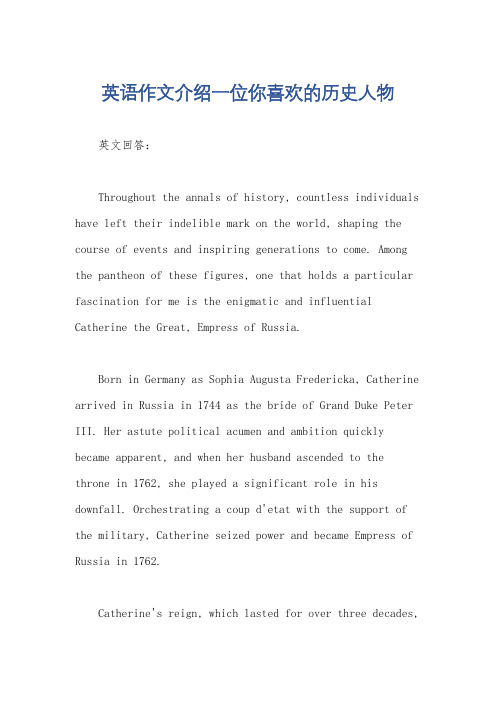
英语作文介绍一位你喜欢的历史人物英文回答:Throughout the annals of history, countless individuals have left their indelible mark on the world, shaping the course of events and inspiring generations to come. Among the pantheon of these figures, one that holds a particular fascination for me is the enigmatic and influential Catherine the Great, Empress of Russia.Born in Germany as Sophia Augusta Fredericka, Catherine arrived in Russia in 1744 as the bride of Grand Duke Peter III. Her astute political acumen and ambition quickly became apparent, and when her husband ascended to the throne in 1762, she played a significant role in his downfall. Orchestrating a coup d'etat with the support of the military, Catherine seized power and became Empress of Russia in 1762.Catherine's reign, which lasted for over three decades,was characterized by a relentless pursuit of territorial expansion and modernization. She successfully annexed vast tracts of land, including Crimea, Poland, and parts of the Ottoman Empire. Under her leadership, Russia emerged as a formidable power in Europe.Beyond her military conquests, Catherine was also a fervent patron of the arts and sciences. She founded the Hermitage Museum in Saint Petersburg, which houses one of the world's most renowned collections of paintings and sculptures. She also supported the development of education and established numerous schools and universities.Catherine the Great was a complex and multifaceted figure. She possessed a vast intellect, a sharp wit, and a tireless work ethic. She was also known for her love of luxury and her numerous любовники (lovers), which became the subject of much gossip and controversy.Despite her achievements, Catherine's legacy is not without its critics. She ruthlessly suppressed dissent and expanded serfdom, which led to widespread peasant unrest.Her foreign policy was also marked by a pragmatism that sometimes came at the expense of ethical considerations.Nevertheless, Catherine the Great remains an iconic figure in Russian history. Her name is synonymous with power, ambition, and cultural progress. She stands as a testament to the indomitable spirit of humanity and the transformative role that individuals can play in shaping the world.中文回答:在历史的浩瀚长河中,无数人物留下了不朽的印记,改变了历史的进程,激励了后世。
小学英语介绍俄罗斯作文
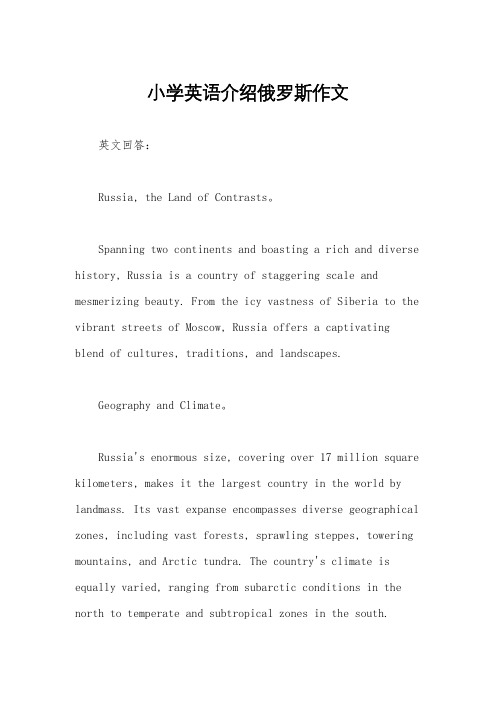
小学英语介绍俄罗斯作文英文回答:Russia, the Land of Contrasts。
Spanning two continents and boasting a rich and diverse history, Russia is a country of staggering scale and mesmerizing beauty. From the icy vastness of Siberia to the vibrant streets of Moscow, Russia offers a captivating blend of cultures, traditions, and landscapes.Geography and Climate。
Russia's enormous size, covering over 17 million square kilometers, makes it the largest country in the world by landmass. Its vast expanse encompasses diverse geographical zones, including vast forests, sprawling steppes, towering mountains, and Arctic tundra. The country's climate is equally varied, ranging from subarctic conditions in the north to temperate and subtropical zones in the south.History and Culture。
Russia's rich history is interwoven with iconic figures, from the legendary tsars of the Romanov dynasty to the revolutionary leaders of the Soviet era. The country boasts a vibrant cultural heritage, with a flourishing arts scene, renowned literature, and classical music. Traditional folk dances, costumes, and crafts are still celebratedthroughout the country.Cities。
英语介绍俄罗斯生活作文

英语介绍俄罗斯生活作文英文:Living in Russia is an experience like no other. The country is filled with rich history, diverse culture, and stunning natural landscapes. I have been living in Russia for a few years now, and I have come to appreciate the unique way of life here.One of the things that stand out to me about living in Russia is the strong sense of community. People here are very close-knit and always willing to lend a helping hand. For example, when I first moved to Russia, my neighbors welcomed me with open arms and helped me settle into my new home. They even invited me to their family gatherings and made me feel like a part of their community.Another aspect of Russian life that I have grown to love is the food. Russian cuisine is hearty and flavorful, with dishes like borscht, pelmeni, and blini being some ofmy favorites. I have also enjoyed exploring the local markets and trying different traditional foods. The Russian people take great pride in their culinary traditions, andit is evident in the care and attention put into each meal.In addition to the sense of community and delicious food, I have also been impressed by the strong cultural traditions in Russia. From the colorful festivals to the beautiful folk music and dance, there is always something to celebrate and take part in. I have had the opportunity to attend traditional Russian weddings and experience the joy and warmth of the celebrations.Living in Russia has also given me the chance to explore the breathtaking natural beauty of the country. From the majestic mountains to the serene lakes and rivers, Russia's landscapes are truly awe-inspiring. I have taken many trips to the countryside and enjoyed outdooractivities such as hiking, camping, and skiing.Overall, living in Russia has been an enriching and fulfilling experience for me. The warmth of the people, thedelicious food, the vibrant culture, and the stunning scenery have all made my time here truly memorable.中文:生活在俄罗斯是一种独特的体验。
俄罗斯旅游英文作文
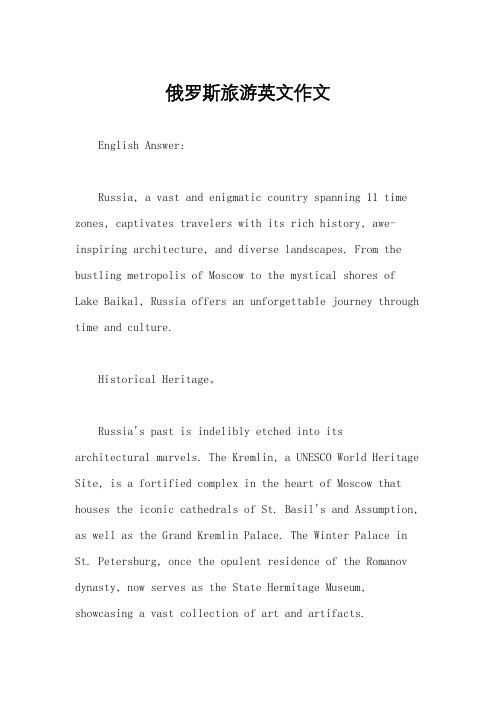
俄罗斯旅游英文作文English Answer:Russia, a vast and enigmatic country spanning 11 time zones, captivates travelers with its rich history, awe-inspiring architecture, and diverse landscapes. From the bustling metropolis of Moscow to the mystical shores of Lake Baikal, Russia offers an unforgettable journey through time and culture.Historical Heritage。
Russia's past is indelibly etched into itsarchitectural marvels. The Kremlin, a UNESCO World Heritage Site, is a fortified complex in the heart of Moscow that houses the iconic cathedrals of St. Basil's and Assumption, as well as the Grand Kremlin Palace. The Winter Palace in St. Petersburg, once the opulent residence of the Romanov dynasty, now serves as the State Hermitage Museum, showcasing a vast collection of art and artifacts.Cultural Delights。
Beyond its historical landmarks, Russia is renowned for its vibrant arts and culture. The Bolshoi Theatre, knownfor its world-class ballet and opera performances, offers a glimpse into the country's rich artistic heritage. The Mariinsky Theatre in St. Petersburg is equally celebrated for its exquisite dance productions. For a taste of traditional Russian culture, visit the Izmaylovsky Kremlin, a vibrant market with artisans selling intricate handicrafts and souvenirs.Natural Wonders。
俄罗斯作文中英文

俄罗斯作文中英文英文作文:Title: The Enchanting Landscape of RussiaRussia, a vast country sprawling across two continents, holds within its borders a rich tapestry of history, culture, and natural wonders that captivate travelers from all corners of the world. From the majestic architecture of Saint Petersburg to the untamed wilderness of Siberia, Russia presents a kaleidoscope of experiences, each more captivating than the last.Saint Petersburg: A City of Palaces and CanalsAt the heart of Russia's cultural heritage lies Saint Petersburg, once the imperial capital, now a UNESCO World Heritage Site. Its grand palaces, such as the Winter Palace, stand testament to the grandeur and opulence of the Tsarist era. The city's iconic canals, modeled after Venice, weave through its streets, offering a romantic cruise experience unlike any other.Moscow: The Soul of RussiaMoving east, Moscow, the modern-day capital, embodies the spirit of Russia. The Kremlin, with its towering walls and iconic Saint Basil's Cathedral, serves as both a political and religious center. The Red Square, surrounded by historic buildings, is a must-visit for anyone seeking to immerse themselves in Russian history.Siberia: A Land of ExtremesBeyond the bustling cities, Siberia unfolds its breathtaking landscapes. From the endless taiga forests to the frozen expanse of the Arctic Circle, Siberia offers a glimpse into nature's raw power. The Lake Baikal, the world's deepest and oldest lake, adds a touch of mystique to this remote region.Culture and TraditionsRussia's rich cultural heritage is intertwined with its traditions. From the festive atmosphere of Russian Orthodox Christmas to the passionate dance of the folk ensemble, every aspect of Russian life exudes warmth and hospitality. The country's love for literature, music, and the arts is evident in the works of great writers like Tolstoy and Dostoevsky, and composers such as Tchaikovsky.ConclusionIn conclusion, Russia is a land of contrasts and wonders, where history meets modernity, and nature's majesty coexists with human ingenuity. Whether exploring its vibrant cities, venturing into its vast wilderness, or immersing oneself in its vibrant culture, Russia promises an unforgettable journey for every traveler.中文翻译:标题:俄罗斯迷人的风景俄罗斯,这个横跨欧亚两大洲的辽阔国家,其境内蕴藏着丰富的历史、文化和自然奇观,吸引着来自世界各地的游客。
莫斯科旅游介绍英文作文
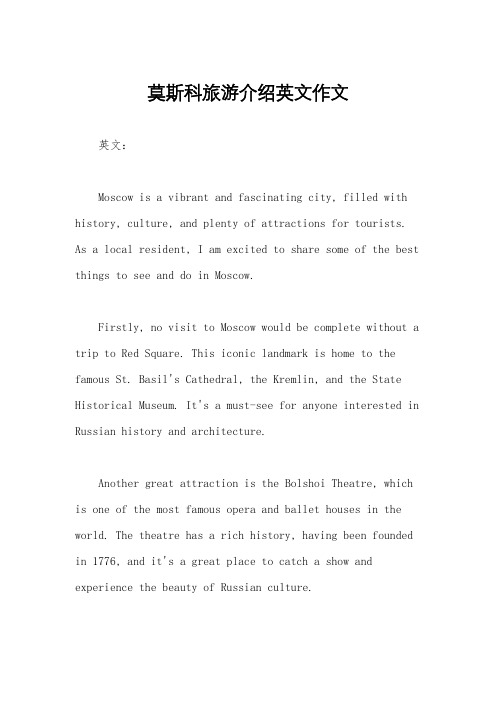
莫斯科旅游介绍英文作文英文:Moscow is a vibrant and fascinating city, filled with history, culture, and plenty of attractions for tourists. As a local resident, I am excited to share some of the best things to see and do in Moscow.Firstly, no visit to Moscow would be complete without a trip to Red Square. This iconic landmark is home to the famous St. Basil's Cathedral, the Kremlin, and the State Historical Museum. It's a must-see for anyone interested in Russian history and architecture.Another great attraction is the Bolshoi Theatre, which is one of the most famous opera and ballet houses in the world. The theatre has a rich history, having been founded in 1776, and it's a great place to catch a show and experience the beauty of Russian culture.For those interested in art, the Tretyakov Gallery is a must-visit. This museum houses an incredible collection of Russian art, including works by famous artists such as Ivan Aivazovsky, Ilya Repin, and Kazimir Malevich.If you're looking for something a bit more off the beaten path, I recommend visiting the Izmailovsky Market. This bustling market is a great place to pick up souvenirs and gifts, and it's also a great spot to try sometraditional Russian food.Overall, Moscow is a city that has something for everyone. Whether you're interested in history, culture, or just want to experience the vibrant energy of a bustling metropolis, Moscow is definitely worth a visit.中文:莫斯科是一个充满活力和迷人的城市,充满着历史、文化和各种各样的旅游景点。
俄罗斯旅游英文作文

俄罗斯旅游英文作文英文:Russia is a vast and fascinating country with a rich history and culture. There are many reasons why someone would want to visit Russia, from exploring the historic cities of Moscow and St. Petersburg to experiencing the natural beauty of Lake Baikal and the Trans-Siberian Railway.One of the main draws for me is the opportunity to learn more about Russian history and culture. I would love to visit the Hermitage Museum in St. Petersburg and see its incredible collection of art and artifacts from around the world. I'm also interested in visiting the Kremlin in Moscow and learning about the history of Russia's government.Another reason I would like to visit Russia is to try the local cuisine. I've heard that Russian food is heartyand delicious, with dishes like borscht, pelmeni, and blini.I would love to try these traditional dishes and see how they compare to the Russian food I've tried in restaurants here in the US.Finally, I'm also interested in experiencing thenatural beauty of Russia. Lake Baikal, located in Siberia,is the deepest lake in the world and is known for itscrystal-clear waters and stunning scenery. I would alsolove to take a ride on the Trans-Siberian Railway, which crosses the entire country and offers breathtaking views of the landscape.中文:俄罗斯是一个广阔而迷人的国家,拥有丰富的历史和文化。
旅游英文作文 俄罗斯

旅游英文作文俄罗斯英文:Traveling to Russia was an amazing experience for me. I was fascinated by the rich history and culture of this country. One of the most memorable places I visited was the Red Square in Moscow. The architecture of the buildings and the vibrant atmosphere left a lasting impression on me. I also had the opportunity to try traditional Russian cuisine, such as borscht and pelmeni, which were absolutely delicious.Another highlight of my trip was visiting the Hermitage Museum in St. Petersburg. The art collection there is truly remarkable, and I was in awe of the beautiful paintings and sculptures. I also enjoyed taking a boat ride along the Neva River and admiring the stunning palaces and cathedrals along the waterfront.I found the Russian people to be very friendly andhospitable. Despite the language barrier, I was able to communicate with locals through gestures and simple phrases.I also learned a few basic Russian words, which helped me navigate my way around the cities and interact with the locals.Overall, my trip to Russia was an enriching experience that allowed me to immerse myself in a different cultureand gain a deeper understanding of the country. I wouldlove to visit again in the future and explore more of what this beautiful country has to offer.中文:去俄罗斯旅行对我来说是一次令人难忘的经历。
俄国人英语作文模板

俄国人英语作文模板英文回答:Introduction。
Russia, with its vast territory and rich cultural heritage, is a country that has always fascinated the world. In recent years, there has been a growing interest in the Russian language and culture, as more and more people are discovering the beauty and depth of this enigmatic nation.History and Culture。
Russia's history is long and complex, with its roots stretching back to the Slavic tribes that inhabited the region in ancient times. Over the centuries, Russia hasbeen shaped by a diverse range of influences, including the Byzantine Empire, the Mongol Golden Horde, and the Western European Renaissance. This rich tapestry of influences has left an indelible mark on Russian culture, which is evidentin its art, music, literature, and architecture.Some of Russia's most famous cultural icons include the works of renowned authors such as Fyodor Dostoevsky, Leo Tolstoy, and Anton Chekhov. Russian classical music is also celebrated around the world, with composers such as Tchaikovsky, Rachmaninoff, and Stravinsky leaving an unforgettable legacy.People and Society。
俄罗斯历史

《俄罗斯历史》课程教学大纲课程代码:070332028课程英文名称:Russian History课程总学时:24 讲课:24 实验:0 上机:0适用专业:俄语专业大纲编写(修订)时间:2017.11一、大纲使用说明(一)课程的地位及教学目标俄罗斯历史为俄语专业基础课,是一门选修课。
授课对象为俄语专业一年级学生,本课程采用双语授课,汉语占70%,俄语占30%,讲授内容为俄罗斯各个时期的历史事件、时代背景、时代特点。
通过本课程的学习,学生将达到以下要求:使学生了解俄罗斯各个时期的历史事件、时代背景、时代特点。
激发学生学习俄语的兴趣,扩大学生的知识面,促进对俄语语言的正确理解与运用,为俄语交际打下良好的基础。
(二)知识、能力及技能方面的基本要求1. 基本知识:学生应了解俄罗斯国家、民族以及教育、科学技术、文学艺术等方面的发展概况;2. 基本理论和方法:了解各个时期的历史事件、时代背景、时代特点概况;3. 基本技能:要求学生具备一定自我学习能力。
(三)实施说明1.教学方法:采取灵活教学方法,结合背景知识讲解,使学生首先产生兴趣,以达到理解记忆的目的;2.教学手段:本课程讲授建议借助教材、图书、声像、图片等资料。
教师在具体的授课过程中可以根据学生的实际情况酌情安排各部分的学时,课时分配表仅供参考;教师在具体授课过程中对与内容不相关的部分可自行安排讲授顺序;(四)对先修课的要求无。
(五)对习题课、实践环节的要求1. 任课教师可以根据学生的实际情况,结合教科书灵活掌握习题的形式、数量、难易程度、补充内容。
2. 培养学生独立查阅工具书的习惯和能力。
3. 根据章节相关内容要求学生查阅资料。
(六)课程考核方式1.考核方式:考查2.考核目标:在考核学生对俄语基本知识掌握情况的基础上,重点考核学生的分析和运用知识技能。
3.成绩构成:最终总评成绩由两部分组成,其中平时成绩占30%,期末成绩占70%。
(七)参考书目:1.《俄罗斯历史》,李英男,等编,外语教学与研究出版社,20092.《俄罗斯概况》,赵爱国、周民权等编,上海外语教育出版,20063.《俄罗斯国情》,金亚娜等编,哈尔滨工业大学出版社, 2002二、中文摘要《俄罗斯历史》是专业选修课。
- 1、下载文档前请自行甄别文档内容的完整性,平台不提供额外的编辑、内容补充、找答案等附加服务。
- 2、"仅部分预览"的文档,不可在线预览部分如存在完整性等问题,可反馈申请退款(可完整预览的文档不适用该条件!)。
- 3、如文档侵犯您的权益,请联系客服反馈,我们会尽快为您处理(人工客服工作时间:9:00-18:30)。
Ivan the Great (1480)
Leads rebellion against the Mongols Freed Russian cities from Mongol control
Ivan the Terrible (1533)
Becomes Tsar of Russia as a 3 yr.old
People from Norway, Sweden, Finland Main city is Novgorod Oleg Vladimir I
Major Rulers:
Map of Russia (850-1235 A.D.)
Yaroslav the Wise (1030 A.D.)
Serfs (peasants)
Problems with Feudal System
World was cha” culture had given up on the feudal system Russia becoming more industrial Serfs no longer need protection
Russian History
Lecture #1 Ancient History – The Romanov’s
Outline – Russia Lecture #1
• Ancient Russia
– Settlement of Russia – Yaroslav the Wise – Mongol Invasion of Russia
Peter the Great (1689)
Moved capital to St. Petersburg Made Russia more like Europe
Military Technology Clothing (even facial hair!) Laws
Established feudal system in Russia
Russian History
Lecture #2 Napoleon's Invasion – Russian Revolution
Outline – Russia Lecture #2
• Napoleon's Invasion of Russia
• Feudal System and Serfdom • Russo-Japanese War
Expanded Russian land into Siberia Attacked his own followers if they displeased him (including his own son)
Romanov Dynasty
Rules Russia until end of World War I Michael Romanov elected in 1613
Ruling class
Tsar and family
Nobles
Land owners, Barons & Knights Need serfs to work the land Land workers (farmers) Need nobles to protect them from invaders, criminals
• Retaking Russia
– Ivan the Great – Ivan the Terrible
• Romanov Dynasty
– Peter the Great – Catherine the Great
Ancient Russia
850 A.D.
Russia settled by Scandinavians
French Army Invading Russia French Army Retreating From Russia French Army Making it Home
650,000
40,000
10,000
Feudal System (Serfdom)
3 classes of people
Why he invaded Russia?
Result?
Napoleon’s Defeat
Russian’s would not fight
Scorched Earth tactics
French supply lines too long Russian winters too cold Russian army blocked retreat
Made written laws
Encouraged Artists Made alliances with other states
Divided the country up among his children when he died
Map of Russia (1235)
Invasion of Mongols (1237)
Catherine the Great (1762-1796)
Encouraged museums, new buildings, libraries Believed in equality, but treated the poor badly Very good at foreign policy Expanded Russian borders
Most of Russia conquered by Mongols
States forced to pay “tribute” to Mongols Mongols control Russia for next 200 years City of Novgorod remains in Russian control
• World War I • Russian Revolution
Napoleon Invades Russia
Who was Napoleon?
Emperor of France Conquered nearly all of Europe To teach other countries a lesson Disastrous defeat for Napoleon
